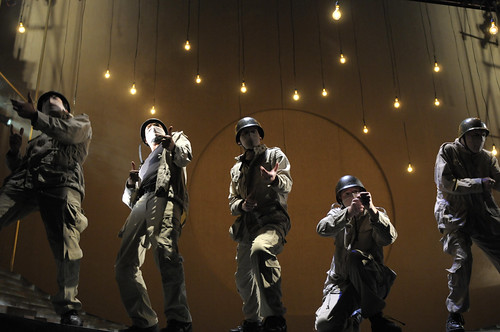
This weekend I went to a preview of the phenomenal new ACT production War Music, a modern reinterpretation of the Illiad based on the translation (or retelling, really) of Christopher Logue. This is a very powerful piece of poetry, with a percussive meter that was used to good effect in the staging.
About a dozen or so actors took on about 40 different parts, and mostly wore identical costumes based on present-day military desert fatigues, with small variations (the Greeks had red berets, the Trojans blue -- the gods wore carnival masks). This made the complex story harder to follow than it had to be.
The gods were played in a comical style which was very effective in conveying their vanity and caprice, although this sometimes went overboard into farce (Poseidon wearing a diver's mask and flippers, for instance).
The set was a minimalist-modern set of risers, with a golden model of the city of Troy set at the back of the stage. I thought that the presence of the sea was indicated very effectively by the use of large billowing cloths. Lighting was also quite effective, especially the use of a multitude of bare bulbs like traced fire that descended during a battle scene. Despite the name, music was not a very prominent element in the show.
This play seems to have gotten rather poor reviews, and I'm not sure why -- perhaps because it isn't structured much like a traditional play. It's really a dramatic reading of a poem, and the poetry is the strongest element of the production. So, here are the opening verses. It seems the only way I can actually manage to slow myself down enough to give poetry a decent reading is by saying it aloud, or by retyping it.
Picture the east Aegean sea by night,
And on a beach aslant its shimmering
Upwards of 50,000 men
Asleep like spoons beside their lethal Fleet.
Now look along that beach, and see
Between the keels hatching its western dunes
A ten-foot-high reed wall faced with black clay
And split by a double-doored gate;
Then through the gate a naked man
Whose beauty's silent power stops your heart
Fast walk, face wet with tears, out past its guard,
And having vanished from their sight
Run with what seems to break the speed of light
Across the dry, then damp, then sand invisible
Beneath inch-high waves that slide
Over each other's luminescent panes;
Then kneel among those panes, beggar his arms, and say:
"Source, hear my voice.
God is your friend. You had me to serve Him.
In turn, He swore: If I, your only child,
Chose to die young, by violence, far from home,
My standing would be first; be best;
The best of bests; here; and in perpetuity.
And so I chose. Nor have I changed. But now--
By which I mean today, this instance, now --
That Shepherd of the Clouds has seen me trashed
Surely as if He sent a hand to shoo
The army into one, and then, before its eyes,
Painted my body with fresh Trojan excrement."
Sometimes
Before the gods appear
Something is marked:
A noise. A note, perhaps. Perhaps
A change of temperature. Or else, as now,
The scent of oceanic lavender,
That even as it drew his mind
Drew from the seal-coloured sea onto the beach
A mist that moved like weed, then stood, then turned
Into his mother, Thetis', mother lovelost face,
Her finger, next, that lift his chin, that push
His long, redcurrant-coloured hair
Back from his face, her voice, her words:
"Why tears, Achilles?
Rest in my arms and answer from your heart."
The sea as quiet as light.
Random connection: Christopher Logue is on record as calling war "a criminal activity", which echoes Charles Tilly's paper War Making and State Making as Organized Crime, found via recommendation by reader bhyde. Me talking about the similarities between governments and organized crime were what got me started arguing with Michael S, back on Mencius Moldbug's blog. It's all connected, somehow.
